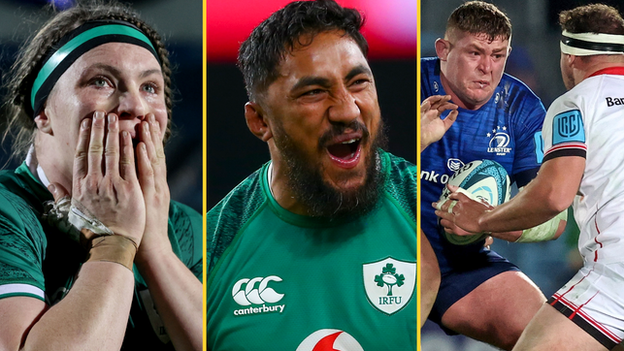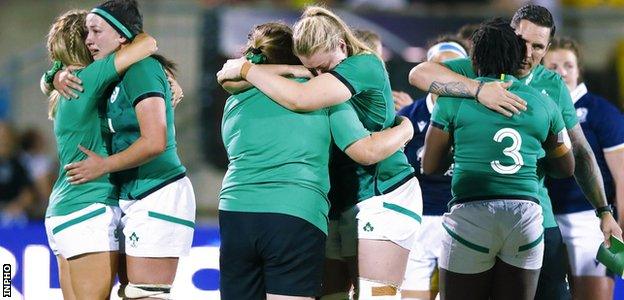Review of the Year: Irish women's rugby in turmoil but Farrell's men turn the page
- Published

It has been an eventful year in Irish rugby with extraordinary highs and lows
An optimist might say that necessary seeds for change within the women's game in Ireland have been sown, and that brighter times must lie ahead.
It is hard to imagine how relations between players and governing body, at least publicly, could be much worse than they currently are after a deeply troubling year for the women's game.
To unpack all that has happened it is best to begin with the most recent development. On 17 December the IRFU announced they would fully publish the contents of two ongoing reviews having initially planned to only publicly release select findings.
This change of heart came shortly after 59 past and present players, including arguably the biggest names in the history of the women's game in Ireland, wrote to the government expressing a loss of "all trust and confidence" in the IRFU.
In response government ministers have sought a meeting with the IRFU to discuss the issues raised in the letter.
The letter and subsequent response are the result of a rapidly deteriorating relationship which came to a head on numerous occasions this year.
Defeats by Scotland and minnows Spain saw Ireland, semi-finalists in 2014, miss out on qualification for next year's World Cup in New Zealand. Following those losses the IRFU announced a review into the implementation of the 2018-2023 Women in Rugby Action Plan, the main aims of which - including Olympic sevens qualification, a top-six placing at a World Cup and a Six Nations title - have not been achieved.
Additionally, a review into the team's failure to qualify for the 2023 tournament was ordered.

A last-gasp loss to Scotland ended Ireland's hopes over qualifying for next year's World Cup
This was after the governing body held another review into the circumstances that saw Ulster and Connacht players forced to change beside rubbish bins before their inter-provincial encounter in September.
Signs of anger and disillusion among players became more obvious in November when director of women's rugby Anthony Eddy denied that the 15-a-side game had been neglected in favour of the seven's programme.
Numerous ex-players spoke out against Eddy's comments as did current squad member Cliodhna Moloney, with multiple team-mates displaying public shows of support.
The new year will also begin with new leaders, after news that head coach Adam Griggs was to be replaced by Greg McWilliams was followed by captain Ciara Griffin announcing her shock retirement at the age of just 27 as Ireland ended the year with autumn wins over the USA and Japan.
Griffin was among the players to sign the letter addressed to government ministers, with many current players also adding their name to the list of signatories.
Players and fans alike hope that, if nothing else, by addressing the issues that came to the fore in 2021 they can ensure future teams will enjoy happier times.
Men's team enter New Year with a spring in the step
Things are looking brighter for the men's team, who go into 2022 on the crest of a wave following their autumn Test series clean sweep and most notably that win over New Zealand.
By the time the All Blacks arrived in Dublin in mid-November there was a tentative, whispered excitement that Ireland might just have picked up enough of a head of steam to run the world's number one side close.
That occasion, as memorable for the atmosphere as it is for the performance, felt like something of a flag in the ground for Andy Farrell.
When 2021 began things were not nearly as rosy in the green garden. The jury was still out on Farrell's suitability as head coach after the first year produced lukewarm results and performances.
Consecutive Six Nations defeats by Wales and France kicked off the year and the malaise that took hold in Joe Schmidt's last season at the helm seemed to be descending once more.

Johnny Sexton scored a try on his 100th cap for Ireland in their win over Japan in November
And then, slowly, it started to click. The fact that Ireland's next assignment was against a stagnant Italian side certainly helped in providing something of a morale boost.
They carried confidence taken from a thumping win in Rome to Murrayfield, where a late collapse having been well on top of dangerous opposition threatened to put paid to Ireland's short-lived burst of momentum. However Farrell's side regrouped with the scores level, earning a penalty that Johnny Sexton converted into the winning score.
Two wins in the bag and everything suddenly felt a little more hopeful. Next up England, who had defeated Ireland in each of their last four encounters but arrived at the Aviva Stadium in March out of sorts and met a side who felt they had a point to prove having lost the physical battle hands down in recent meetings.
Ireland's win was emphatic and delivered in the expansive manner envisioned by Farrell when he first took over.
Summer successes over Japan and the USA followed for a young squad, before the trio of autumn victories against the Japanese, New Zealand and Argentina consolidated what Irish fans dared to believe after the end of the Six Nations: that the struggles in translating Farrell's desired system onto the pitch appeared to be teething problems as opposed to an inability to produce such a style of rugby.
Consolidating their gains and cementing themselves among the top sides is Ireland's brief for 2022, which begins at home to Wales on 5 February.
Leinster remain on top as other provinces search for silverware
A familiar shade of blue dominates the story of the provinces in 2021.
Seven games into the inaugural season of the United Rugby Championship Leinster have assumed top spot and fully intend to stay there for the foreseeable future.
Throughout the year they have continued as the dominant force in Irish rugby, beating Munster in the Pro14 final to clinch the league title for a fourth straight year.
The eastern province didn't have everything their own way though, and found themselves on the receiving end of the kind of physical domination they are so used to inflicting on others when they were defeated by familiar foe Ronan O'Gara's La Rochelle in the Champions Cup semi-final.
It was a trophy-less season for the other three provinces, but they all still provided some memorable moments for their supporters.

Leinster beat Munster in March to claim their fourth consecutive Pro14 title
Indeed Connacht began the year with a scintillating win over Leinster in Dublin which ended their 26-match unbeaten run in the league. Connacht have long established themselves as a team capable of producing such excellence, however doing it on a regular basis is the next step in the evolution of the URC's wildcard.
Munster will soon find themselves under new management with senior coaching duo Johann van Graan and Stephen Larkham leaving the club in summer, after they once again made it to the business end of the season without having any silverware to show for it.
The same applied to Ulster, whose wait for a trophy goes on. The northern province understandably felt hard done by that the shortened Pro14 season saw them miss out on securing a play-off match despite losing just two of their 16 games.
What will sting far more however is how their European Challenge Cup campaign ended. Dan McFarland's side were 40 minutes away from a Twickenham final having opened up an 11-point lead over Leicester, only for the Tigers to roar back to claim the final berth and leave Ulster to ponder a 15th season without a trophy.
Despite the disappointment, hope abounds for the northern province. Back-to-back European wins, and a rare win over Leinster in Dublin, have provided Ulster fans with real reason for optimism as they head into the new year.